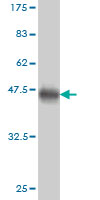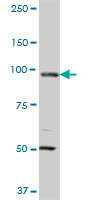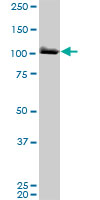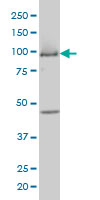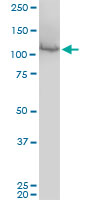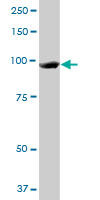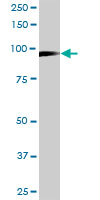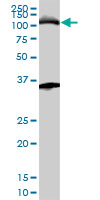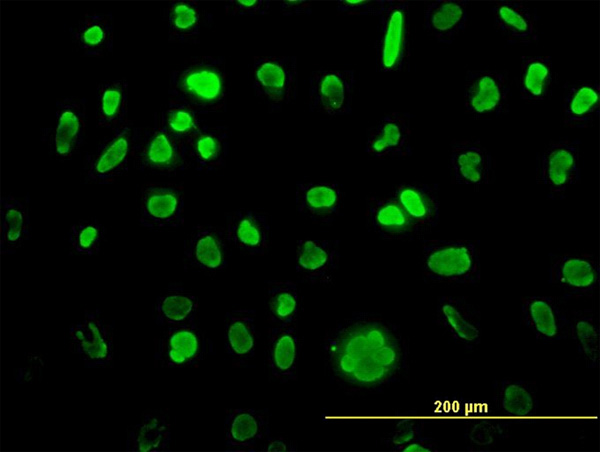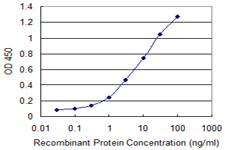MCM3 Antibody (monoclonal) (M01)
Mouse monoclonal antibody raised against a partial recombinant MCM3.
- 产品详情
- 实验流程
- 背景知识
Application
| WB, IF, E |
|---|---|
| Primary Accession | P25205 |
| Other Accession | NM_002388 |
| Reactivity | Human, Mouse |
| Host | mouse |
| Clonality | monoclonal |
| Isotype | IgG2a Lambda |
| Clone Names | 4F7 |
| Calculated MW | 90981 Da |
| Gene ID | 4172 |
|---|---|
| Other Names | DNA replication licensing factor MCM3, DNA polymerase alpha holoenzyme-associated protein P1, P1-MCM3, RLF subunit beta, p102, MCM3 |
| Target/Specificity | MCM3 (NP_002379, 699 a.a. ~ 808 a.a) partial recombinant protein with GST tag. MW of the GST tag alone is 26 KDa. |
| Dilution | WB~~1:500~1000 IF~~1:50~200 E~~N/A |
| Format | Clear, colorless solution in phosphate buffered saline, pH 7.2 . |
| Storage | Store at -20°C or lower. Aliquot to avoid repeated freezing and thawing. |
| Precautions | MCM3 Antibody (monoclonal) (M01) is for research use only and not for use in diagnostic or therapeutic procedures. |
For Research Use Only. Not For Use In Diagnostic Procedures.
Provided below are standard protocols that you may find useful for product applications.
BACKGROUND
The protein encoded by this gene is one of the highly conserved mini-chromosome maintenance proteins (MCM) that are involved in the initiation of eukaryotic genome replication. The hexameric protein complex formed by MCM proteins is a key component of the pre-replication complex (pre_RC) and may be involved in the formation of replication forks and in the recruitment of other DNA replication related proteins. This protein is a subunit of the protein complex that consists of MCM2-7. It has been shown to interact directly with MCM5/CDC46. This protein also interacts with, and thus is acetlyated by MCM3AP, a chromatin-associated acetyltransferase. The acetylation of this protein inhibits the initiation of DNA replication and cell cycle progression.
REFERENCES
Human cytomegalovirus IE86 protein binds to cellular Mcm3 protein but does not inhibit its binding to the Epstein-Barr virus oriP in U373MG-p220.2 cells. Song YJ, et al. Acta Virol, 2010. PMID 20545442.Centrosome-related genes, genetic variation, and risk of breast cancer. Olson JE, et al. Breast Cancer Res Treat, 2010 May 28. PMID 20508983.Analysis of interaction partners of H4 histone by a new proteomics approach. Saade E, et al. Proteomics, 2009 Nov. PMID 19862764.Minichromosome maintenance protein 3 is a candidate proliferation marker in papillary thyroid carcinoma. Lee YS, et al. Exp Mol Pathol, 2010 Feb. PMID 19818763.Phosphorylation of MCM3 on Ser-112 regulates its incorporation into the MCM2-7 complex. Lin DI, et al. Proc Natl Acad Sci U S A, 2008 Jun 10. PMID 18524952.
终于等到您。ABCEPTA(百远生物)抗体产品。
点击下方“我要评价 ”按钮提交您的反馈信息,您的反馈和评价是我们最宝贵的财富之一,
我们将在1-3个工作日内处理您的反馈信息。
如有疑问,联系:0512-88856768 tech-china@abcepta.com.























 癌症的基本特征包括细胞增殖、血管生成、迁移、凋亡逃避机制和细胞永生等。找到癌症发生过程中这些通路的关键标记物和对应的抗体用于检测至关重要。
癌症的基本特征包括细胞增殖、血管生成、迁移、凋亡逃避机制和细胞永生等。找到癌症发生过程中这些通路的关键标记物和对应的抗体用于检测至关重要。 为您推荐一个泛素化位点预测神器——泛素化分析工具,可以为您的蛋白的泛素化位点作出预测和评分。
为您推荐一个泛素化位点预测神器——泛素化分析工具,可以为您的蛋白的泛素化位点作出预测和评分。 细胞自噬受体图形绘图工具为你的蛋白的细胞受体结合位点作出预测和评分,识别结合到自噬通路中的蛋白是非常重要的,便于让我们理解自噬在正常生理、病理过程中的作用,如发育、细胞分化、神经退化性疾病、压力条件下、感染和癌症。
细胞自噬受体图形绘图工具为你的蛋白的细胞受体结合位点作出预测和评分,识别结合到自噬通路中的蛋白是非常重要的,便于让我们理解自噬在正常生理、病理过程中的作用,如发育、细胞分化、神经退化性疾病、压力条件下、感染和癌症。
